Search
10 items
-
Dayton Divests
In June 2014, the University of Dayton became the first Catholic university in the United States to announce their divestment from coal and fossil fuels. Members of the university staff see this move as part of the university’s commitment to “being a responsible steward of the Earth’s natural resources.” This decision was commended by the president of the Association of Catholic Colleges and Universities. Their decision was one inspired by faith reflection as well as a commitment to financial stability for the university.
Beyond divesting from coal and fossil fuels, the university has taken further steps to move their campus toward efficiency and sustainability. The university now has two full time employees who work to improve campus sustainability and offers academic programs in these areas as well. The University of Dayton is also home to the Hanley Sustainability Institute. -
Pope Tells Oil Executives to Act on Climate: "There Is No Time to Lose’”
This past Saturday, the pope gathered leaders of the world’s largest oil companies for a closed-door conference at the Vatican. He commended oil and gas companies for progress made in developing more careful approaches to assess of climate risk and adjustments made to their business practices. However, these actions are not enough. Pressure has been building on oil and gas companies to transition to less polluting forms of energy, often coupled with the threat of fossil-fuel divestment.
The pope reiterated his call for a transition from fossil fuels “to a greater use of energy sources that are highly efficient while producing low levels of pollution.” He emphasized that the poor who would suffer the most from the effects global warming. And that we owe it to the poorer countries and future generations. -
Irish Bishops Announce Divestment from Fossil Fuels Ahead of the Pope's Visit
The Irish Catholic Bishops Conference announced it would divest from fossil fuels hours before the arrival of Pope Francis. The bishop's move means withdrawing investments in 200 oil and gas companies within five years. The bill was introduced in the Irish Parliament, requiring the country’s sovereign wealth fund to divest from all fossil fuels. If the Irish bill passes, it will make Ireland the first government to divest from fossil fuels. -
Presbyterians and Climate Change
This article posted on Yale Climate Connections discusses grassroots efforts of Presbyterian organizations, and notes specific time frames of salient Presbyterian accomplishments with regard to climate change. The following excerpt provides a general overview of their goals and mission:
"Presbyterians are engaged in many activities to combat climate change, from Earth Forums to hunger programs addressing food and climate crises and protests against practices that encourage reliance on coal. Since 2010, the Presbyterian Church has given 80 congregations an Earth Care Congregation Certification for demonstrating a strong commitment to environmental care." -
Episcopal Church, Church of Sweden, ELCA commitment: "Sustaining hope in the face of climate change"
The heads The Episcopal Church, the Church of Sweden, and the Evangelical Lutheran Church in America (ELCA) signed a joint commitment to climate statement. The following are five salient points from their commitment:
"1) Advocate for national and international policies and regulations that enable a swift transition from dependence on fossil fuels to clean, safe, renewable energy, and for economic systems that are fair and just.
2) Sustain an interfaith, international conversation around climate change and social and economic justice while working to keep climate change in the public’s attention.
3) Encourage our faith communities to deeper theological reflection on the moral and ethical response to climate change, and then to make public witness about climate change through advocacy at the local, national and international levels.
4) Invite our communities to prayerfully consider how their own actions, lifestyle choices – particularly our energy consumption -- affect the environment.
5) Offer our communities continued opportunities to learn about climate change and the universal church’s response to this crisis." -
The Jewish Cantor Raises Up Themes of Thanksgiving
Before the Thanksgiving holiday fades entirely from memory, I wanted to share a thoughtful op-ed published in the Richmond Times-Dispatch by Rachel Rhodes, a Jewish leader in Virginia. The link below discusses her reflections on Jewish links to the natural world and good tidings from the mountains. -
Lutherans Reflect on Climate Change Conference in Copenhagen
This article discusses some of the sentiments regarding proceedings from the 2009 United Nations Climate Change Conference in Copenhagen. While some attendees expressed disappointment in the outcome, others were more optimistic about steps which may lead to more effective action for climate change in the future. The following excerpt provides a brief description of the event:
"More than 3,000 ELCA members, along with a coalition of U.S. faith leaders, sent some 20,000 postcards to President Barack Obama, urging him to be at the meeting, she said. Obama attended the conference and urged leaders of Brazil, China, India and South Africa to join the United States 'to fund developing nations' projects to deal with droughts,
floods and other impacts of climate change, and to develop clean energy,' among other agreements, according to a U.N. news release." -
Five Years After Speaking Out on Climate Change, Pope Francis Sounds an Urgent Alarm
This article covers Pope Francis's reaction to the world governments responses to climate change. The Pope writes to unite people through religion in an effort to bring awareness to the movement. The article details how the church is divesting in fossil fuel companies. The article also focuses on the political divide and how it affects people's views on the climate crisis. -
GOP Rep. Mike Simpson: "It’s my party, and I’ll fight climate change if I want to"
An article published on Grist.org that covers Congressman Mike Simpson's views on salmon conservation. Simpson's statements are noteworthy for sustainability and religion as he is going against Republican party views by acknowledging an issue with climate change and the environment with his religious views. It is reported that his speech was obviously fueled by a spiritual obligation to preserve salmon as he describes salmon as incredible God created creatures and that their cycle of life should not be messed with. It is also important to note he was already elected for his 11th term in the house, so it is less likely that his more left leaning statements come from a desire to secure votes. -
How to Green your Parish
This article is about the importance of parishes to participate in environmentally sustainable actions based on Pope Francis’s Laudato Si’. It encourages parishes to strive to become more eco-friendly by taking work together as a community and focusing on change one issue at a time. The article focuses on three main areas: reducing the parishes greenhouse gas, sustaining food and land use, and preserving water.










